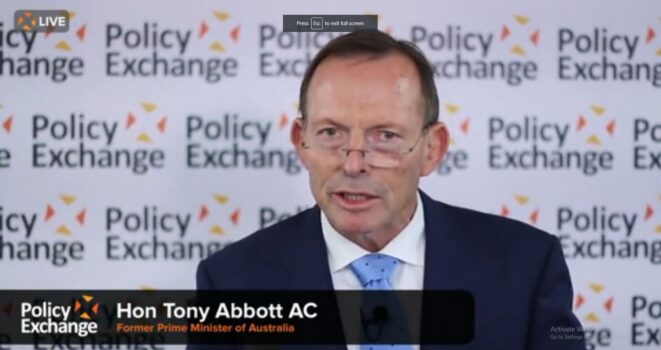Companies need to ensure that there are no Chinese products in their supply chain: Former Prime Minister
Former Australian Prime Minister Tony Abbott urges business leaders to strive to minimize Beijing’s impact on the supply chain, rather than focusing on short-term profits.
In a speech to the UK’s right-wing think tank Policy Exchange, the former Prime Minister also admitted that his government was too naive to deal with Beijing in 2014, when the China-Australia free trade agreement was approved. rice field.
“As Australia has discovered, the Beijing government sees trade as a strategic weapon to turn it on and off like a tap to reward friends,” Abbott said.
“In my judgment, it is the concern of all companies to minimize the important places that Chinese intermediate goods may have in the supply chain so that they are not rejected when they are most needed. It should be, “he added.
“It does not generally deny that companies need to minimize their costs and maximize their quality and benefits to shareholders,” he said. “But this can be one of the cases where long-term natural benefits do not match short-term economic benefits and require a business leader to be more than just commercial knowledge.”
Abbott also called for a national audit of commodities that Australia should stockpile to hedge supply chain disruptions and national emergencies.
The former Prime Minister is currently an advisor to the UK Board of Trade, which is tasked with expanding trade relations after Brexit.
Abbott spoke extensively about Australia-China relations, saying that after 40 years of “bid and hide,” Beijing was active on the world stage and engaged in a “new Cold War.”
“This is far more formidable than the former Soviet Union, because it can be increasingly incorporated into the global economy and bring economic and military pressure to counter its goals,” he said. Told.
The former Prime Minister added that “considering the conclusion of today’s trade agreement” would be difficult given Beijing’s economic coercion against Australia over the past year.
“By 2014, when the free trade agreement was signed, we had a very conscientious view of China,” he said. “Now, in retrospect, it looks like wishful thinking.”
“But at that time, I was convinced that China would gradually undergo political liberalization as well as economic liberalization,” he added.
“We thought that over time there would be considerable convergence and in a sense China would be like us. In fact, we may have been like them.”
Australia-China relations have plummeted since April 2020 after Beijing introduced a series of bans, suspensions and tariffs on Australia’s exports to China.
The penalties followed a call from Foreign Minister Marize Pain for an independent investigation into the origin of COVID-19.
